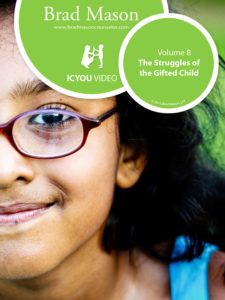What is Twice Exceptional?
What is Twice Exceptional?
What if a child is gifted enough that nobody notices they are dyslexic, and dyslexic enough that nobody notices they are gifted? How often could this happen? The National Association for Gifted Children http://www.nagc.org/ reports that an estimated 360,000 students in America are twice exceptional gifted learners. Add in a guess at the number of adults fitting this category, and we are talking about a million people.
Twice exceptional, or 2e, is a term used to describe someone who is both gifted and has another condition such as dyslexia, Learning Disabled, ADHD, Bipolar, Autistic, OCD, anxiety disorder, and so-on.
I remember meeting a student in my practice who was in the second or third grade. He was stubbornly refusing to do his homework. He had very good, diligent parents, so they were quite concerned about his defiance. I learned he was very interested in Greek mythology, so I asked him to tell me about it. Oh, did he go on. He knew all about it, describing various figures and telling their stories in great detail with enthusiasm and spark in his eye. His level of detail and grasp of the dynamics at play between mythological characters was well beyond what would be expected for his age.
How does a child who allegedly does not like to read learn and remember so much, I wondered. I asked him to read from a book for me, and learned he often refused to read out loud in school. He agreed, and his reading was slow and labored, misreading many of the words. Evidently, he was smart enough to fill in the missing gaps to get the meaning, but it was slow going and a lot of work.
What if, I thought out loud to his parents, their boy was dyslexic, and nobody noticed because he was also so gifted that he managed to perform well enough on tests? His parents liked that idea much better than thinking he just had bad behavior and a lousy attitude. They approached the school, had him evaluated. Guess what? He was significantly dyslexic, qualified for assistance, as well as gifted, qualifying for the gifted and talented program. Life for this family got better.
This was not an isolated case in my practice. I have encountered similar situations again and again. Evaluation and correct identification of twice exceptional people are very difficult because all of these conditions have overlapping symptoms. Trouble paying attention, poor emotional control and emotional intensity, difficulty socializing, intense focus on a specific topic of interest, challenging authority, perfectionism, failing, in many ways, to “fit in.” Do they better fit, for example, gifted or ADHD, or are they better described as both gifted and ADHD?
I hope this helps you correctly identify someone who answers this question: What is twice exceptional?
We have a rising prevalence of Autism Spectrum Disorder identification. Many of these people struggle in some areas, such as demonstrating expected social behavior and emotional reactions, and willingness to comply with adult requests. Often both children and adults on the Autism Spectrum have specific areas where they excel. They may be very gifted as engineers, or artists, voice acting, inventing, and more. They are at great risk for failing to have their talents and abilities properly identified, valued, and supported so that their gifted talents can be developed. Their behaviors may interfere with appropriate identification as gifted, their special programming only targeted at what they are not and may never be great at. That’s a problem begging to be solved, if you ask me.
If I had my way, IEP’s would target developing strengths.
 Signs a student may be twice exceptional include:
Signs a student may be twice exceptional include:
Well developed vocabulary
Intense curiosity about subjects outside of school
Poor social skills
Sensitivity to criticism
Inconsistent academic performance
Interest in interacting with adults over peers
Problem solving ability for complex issues
Stubborn
Impulsive
Non-conforming
Intense interest in specific topic
Poor organization and study skills
Trouble with written expression
Quirky and subtle sense of humor
If you know someone like this, I hope you will advocate for them and refuse to give up. I see a lot of kids who are clearly gifted and fail to qualify for specialized programming because of behavioral issues or teacher ratings in “leadership skills” that are often part of the identification process. If their needs were better served, perhaps the behavior issues would abate.
Misdiagnosis
Medical and mental health professionals rarely receive training in identification and treatment of
gifted individuals as ADHD, ODD, Bipolar, OCD, Anxious, or having Asperger Syndrome.
Managed care has created a push for a quick diagnoses and medication. Few exceptional
children fit any diagnostic categories well and may sort of fit many diagnostic categories,
creating confusion and dis-abling labels.
Sometimes it’s not the child but the environment that creates the problems. Some children and
adults may be twice exceptional, having both a learning disability or difference, as well as being
gifted. These two conditions may mask one another resulting in inappropriate or lack of proper
treatment.
So what if your child could be described as gifted and emotionally intense, or gifted and easily bored, gifted and challenging, a little professor, a gifted and perfectionistic student, rather than bipolar or ADHD or high-functioning autistic? How would you like others to think about them, and how would you like them to think about themselves? Emphasize the strengths, or emphasize the weaknesses? In other words, if they could be described either way, and you didn’t need a diagnostic category for educational placement or medical treatment, could you have a choice? Is it which one is true, or which do you prefer, like in the movie Life of Pi?
The stories we tell about ourselves and one another are very powerful. They inform us in how we should think, behave, and believe. Make your story a good one, a story you love.
Many of the people who have come to see me in my practice are complex like this. Few can be adequately described, categorized, or served effectively using a single category. That’s why, when I created the intensivecareforyou.com video course series, I covered such a broad spectrum. I also sought to bring in perspectives and interventions from outside the scope of the disciplines I was trained and practiced in. I am also twice exceptional, or maybe three or four times, then again maybe not at all, depending on who you talk to!
As a side note, when I was making the video course The Struggle of the Gifted Child, I met my wife for the first time, a gifted DaVinci robotic surgeon. I wanted to interview a gifted woman about what it was like to be a gifted girl in public school, so our first meeting is all recorded! I married her not long after, and we remain happily married. Needless to say, I am sooo glad I decided to make that video!
Gifted characteristics that interfere with proper identification:

Boredom with and refusal of rote and routine tasks, like homework
Self-critical and frustration with mistakes
Difficulty shifting from one topic or activity to the next
Critical of others and authority figures
Inappropriate jokes
Emotionally over-reactive
Lack of interest in details, don’t turn in homework
Stubborn and non-conforming
Dominating or controlling of others
Defiant of authority
Excessive focus on topic of interest
Weak follow through when they have learned what they were after
Resentment of working with those of lesser ability
Weak ability to organize time and assignments
Signs of Perfectionism:
Worries over small mistakes
Difficulty making choices
Focuses on the one thing that’s wrong
Fiercely competitive
Carried away with details
Own worst critic
Never satisfied with own work
Makes excuses or blames others for mistakes
Overly upset when a skill or activity doesn’t come easily
Skips time to rest, play, or socialize because there is too much work
Puts off big projects
Trouble letting go and finishing big projects
These people believe; you are what you do, the world is watching, failure would be totally
humiliating, perfect performance gives them a sense of control that they think will relieve their
anxiety
Tempering Perfectionism
Attunement: don’t disagree, describe wishes or fears, offer affection until they are less upset, you
can reflect but downgrade with semantics to help shift perspective; “I’m an idiot” = “You are
frustrated with your mistake.”
Identify what went right and praise effort and persistence over outcome
Don’t correct their homework
Allow failures and disappointments
Teach smart self-talk and coping strategies but not when they are upset
Focus on reasonable effort rather than “Doing your best.”
Resources
Daniels, S. & Piechowski, M. (2009). Living With Intensity. Tuscon, Arizona: Great Potential Press <Great book about the nature and flavor of intensities in gifted people and ways to manage, one of my favorites>
Delisle, J. & Galbraith, J. (2002). When Gifted Kids Don’t Have all the Answers. Minneapolis, MN: Free Spirit Publishing, Inc. <I liked this text as a source of ways gifted children can struggle, a good overall guide>
Elgin, S. (1996). The Gentle Art of Communicating with Kids. New York: John Wiley & Sons, Inc.
Kennedy-Moore, E. & Lowenthal, M. (2011). Smart Parenting for Smart Kids. San Francisco: Josey-Bass.<Great resource>
Roberts, J. & Boggess, J. (2011). Teacher’s Survival Guide Gifted Education. Waco, Tx: Prufrock Press, Inc. <Good introduction to the special needs of the gifted, differentiated and hands on guiding strategies>
Shenk, D. (2011). The Genius in all of Us. New York: Anchor books.<Makes a compelling argument that giftedness is nurtured and created rather than nature and innate, with research and strategies on how to do this with your child>
Walker, S. (2002). The Survival Guide for Parents of Gifted Kids. Minneapolis, MN: Free Spirit Publishing, Inc.<Good quick-study and there is also a separately available survival guide for the kids themselves that I think is quite good>
Web, J., et al, (2005). Misdiagnosis and Dual Diagnosis of Gifted Children and Adults. Scottsdale, Arizona: Great Potential Press, Inc. <Another favorite of mine, and will challenge conventional thinking about gifted people>
Webb, J., et al, (2007). A Parent’s Guide to Gifted Education. Scottsdale, Arizona: Great Potential Press, Inc.<A rich, in-depth and thorough resource>
Winebrenner, S. (2001). Teaching Gifted Kids in the Regular Classroom. Minneapolis, MN: Free Spirit Publishing, Inc.<Numerous strategies and learning contract forms to help engage the sometimes hard to reach gifted students>
Helpful link:
https://en.wikipedia.org/wiki/Twice_exceptional
Gifted Child- Can they be hard to teach and parent?
I want to create healthy happy life
It can be hard to work with a mind that keeps going to the problems and worries. It's time to teach children their power over thoughts and feelings.
I would like teachable exercises for; replacing thoughts that are not helpful, reasonable, or true, creating joy and emotional resilience, Mindgarden metaphor illustrating power and choice in thoughts, Dream Book strategy for identifying clear goals and building motivation, a video explaining how NOT to let others or situations have the power to bring you down!
